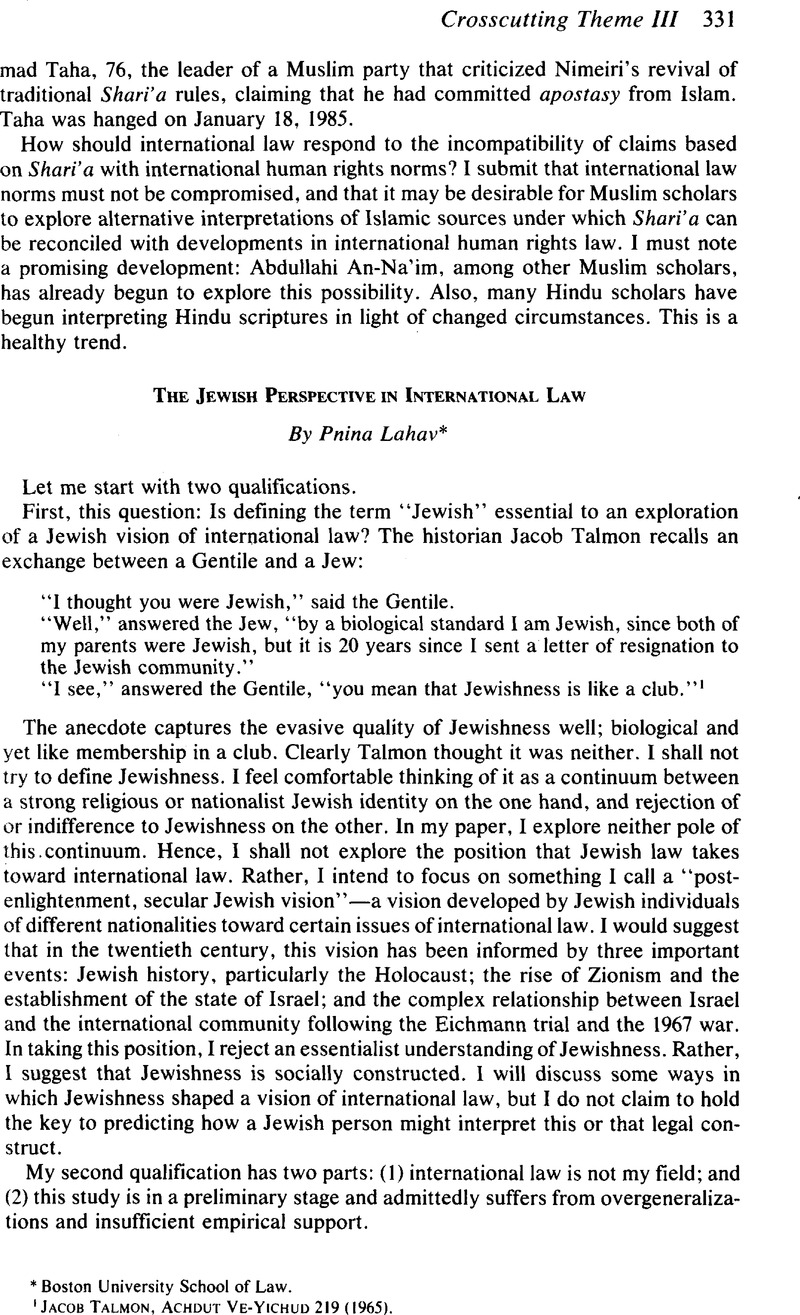No CrossRef data available.
Article contents
The Jewish Perspective in International Law
Published online by Cambridge University Press: 28 February 2017
Abstract

- Type
- Has Religion Served as Catalyst or Impediment to International Law?
- Information
- Copyright
- Copyright © American Society of International Law 1993
References
1 Jacob Talmon, Achdut Ve-Yichud 219 (1965).
2 I wish to distinguish the ideal international law from positive international law, which during the nineteenth century had little interest in the subject of universal human rights.
3 Jenks, C. Wilfred, Hersch Lauterpacht—The Scholar as Prophet, 36 Brit. Y.B. Intl L. 1, 102 (1960)Google Scholar.
4 Lauterpacht rejected positivism to the extent that it excluded norms of natural justice from positive international law. At the same time, he advocated positivizing an International Bill of Rights, thereby integrating natural justice into international law.
5 See Lauterpacht, Hersch, The Function of Law in the International Community 434 (1933)Google Scholar.
6 See Lauterpacht, Hersch, International Law and Human Rights 310 (1950)Google Scholar [hereinafter Human Rights].
7 Supra note 3.
8 Id. at 103.
9 Sir McNair, Arnold Duncan, Hersch Lauterpacht, 47 Proc. Brit. Acad. 371 (1961)Google Scholar.
10 Lauterpacht, Hersch, An International Bill of Rights of Man vii (1945)Google Scholar [hereinafter Bill Of Rights]. In his preface, Lauterpacht traces the first part of the book to a paper read before the Grotius Society in November 1942.
11 Human Rights, supra note 6, at 93.
12 Id. at 158–59.
13 Feinberg, Nathan, Hersch Lauterpacht—Jurist and Thinker, 3 Isr. L. R. 333, 340 (1968)Google Scholar.
14 Supra note 10, at vii.
15 ’For this activity he was tried by a military court (presumably Austrian) and acquitted.” McNair, supra note 9.
16 Lauterpacht, Hersch, The Interpretation of Article 18 of the Mandate for Palestine (1939), in Lauterpacht, Elihu (ED.), 3 International Law, Being the Collected Papers of Hersch Lauterpacht 85 (1977)Google Scholar. The opinion is dated Aug. 24, 1939. In the editor’s note, Eli Lauterpacht, Sir Hersch’s son and an authority in international law in his own right, says that this opinion, “so far as I can make out, [is] the first substantial opinion which he wrote—though he may have assisted the Chinese Government with a memorandum … at the time of the Manchurian crisis.”
17 Id. at 504.
18 Supra note 13, at 343.


